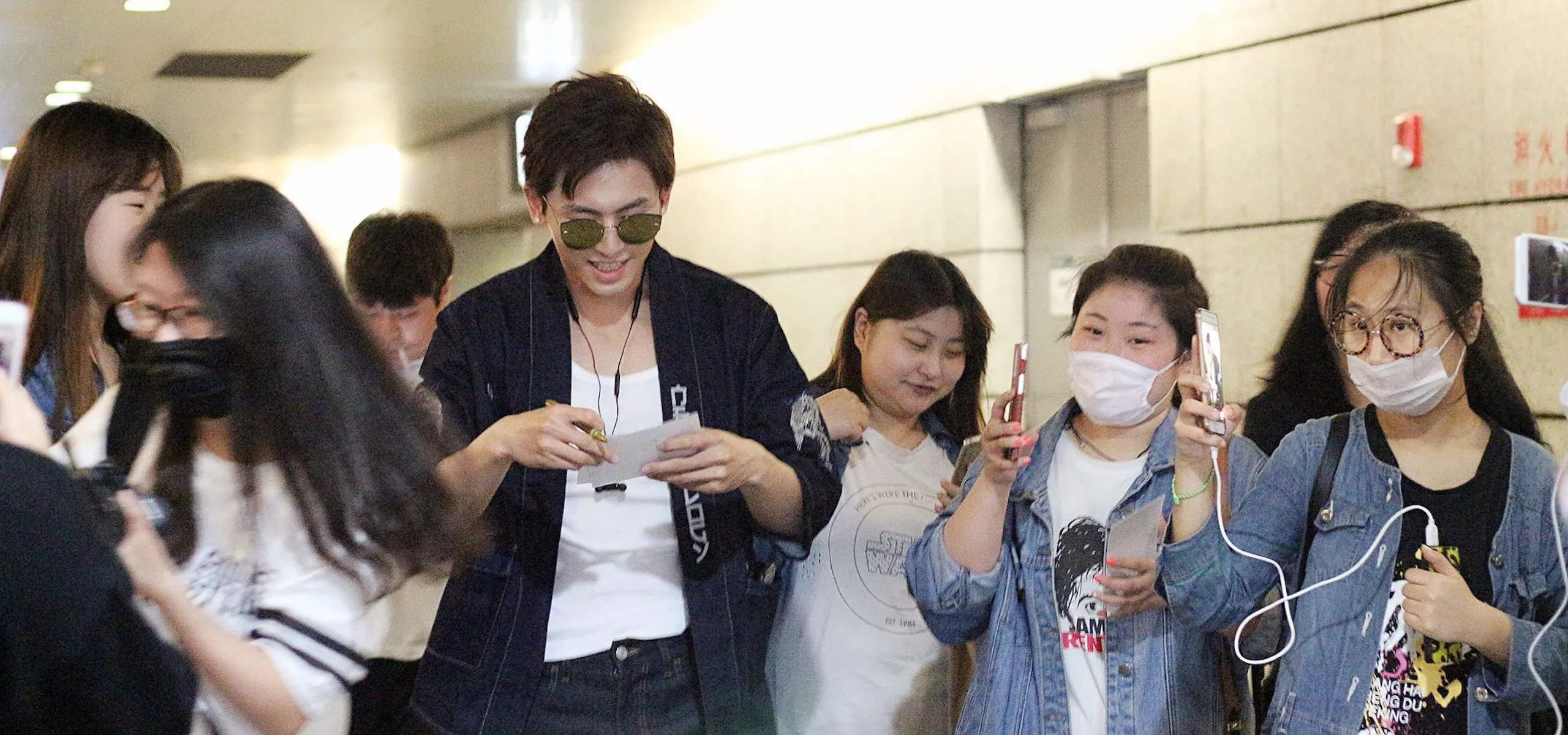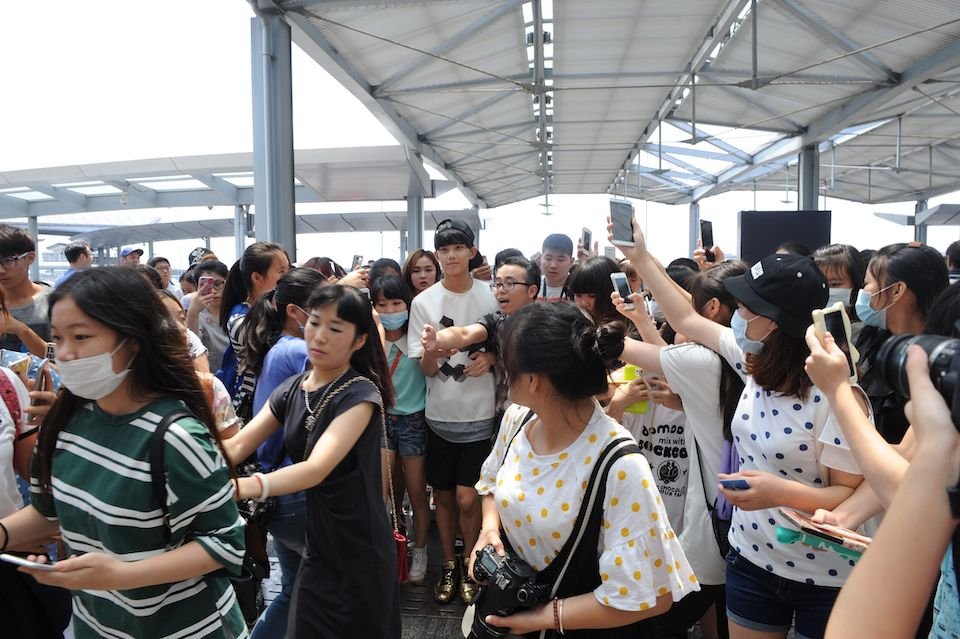As male stars play more complex characters, female fans are giving them traditionally feminine labels
Wherever TV star Zhang Zhehan goes, you can be sure that groups of manic, mainly female, fans will be gathered, hoping to catch a glimpse of their dashing idol.
But listen carefully to the excited screams of the crowds, and you probably won't hear them calling out his name, but shouting: "Wife! Wife! (老婆 lǎopo! 老婆 lǎopo!)."
Zhang rose to fame this year for his role as Zhou Zishu, a ferocious swordsman with a gentle soul in the costume martial-arts drama Word of Honor. He is lauded by fans not for his machismo but for his sentimentality. Apparently, a common way for fans to address him is: "My wife Zhang Zhehan, who is too weak to take care of himself but is a basketball MVP, an excellent singer, a seductive beauty who is sweeter than candy, plus a bad cook and an awful dancer."
Zhang is not the only male star fans have been giving female labels—its part of a trend on social media that has fans of celebs flipping the genders of their idols. The gender reversal, known as “inverted Mary Sue (逆苏 nìsū, or 泥塑 nísù),” is mainly used by female fans toward male stars as a term of endearment, while it also reflects shifting notions of how male stars are perceived—no longer restricted to macho personas, but praised for their cuteness and metrosexual style.
A Mary Sue refers to a (normally female) one-dimensional fictional character who is unfailingly faultless and liked by everyone in the narrative to the point that their perfection becomes boring. While a Mary Sue character may have traditionally masculine traits, an "inverted Mary Sue" refers to fans feminizing male celebs.
In addition to “wife,” male celebrities are addressed as "sister (妹妹 mèimei)," "daughter (女儿 nǚ’ér)," "princess (公主 gōngzhǔ)," "mummy (妈咪 māmī)," and "male mom (男妈妈 nán māmā)." When searching "wife" on Weibo or Bilibili, a video-sharing platform, both male and female celebrities appear.
“The word ‘wife’ subtly conveys my respect and love toward [Zhang],” Ruby Guo, a 25-year-old self-described "expert" fan of Zhang from Beijing tells TWOC.
"After watching him in his role, I discovered that the actor himself also has a fragile and sensitive side. He has performed in many dramas, but was never a hit. He had leg surgery, which forced him to give up his favorite sport, basketball," she says. "Those sufferings made me feel compassionate toward him. Meanwhile, he is strong and competitive, treating his jobs seriously. I admire his qualities, so I mentally hope to protect him and let him accomplish what he wants to do.”
Likewise, terms like "handsome (帅 shuài)" and "cool (酷 kù)" previously reserved mainly for male stars, are increasingly used to describe female celebs. They are also referred to as "my husband (我老公 wǒ lǎogōng)," "big boss (大老板 dà lǎobǎn)," and "brother (哥 gē)" to illustrate their resilient and mature nature.
Rather than pining after more traditional male stars who portray themselves as strong, protective, and heroic, female fans may be more reluctant to be in the "protected" and "dominated" position now. Zhang Yutong, a 24-year-old female fan of Zhang Zhehan and Gong Jun, Zhang Zhehan's co-star in Word of Honor, says that switching the gender of male stars allows women to “put ourselves into an equal and even superior role in the imaginary relationship with our idols."
Online comments express similar sentiments. "By inverting the male's gender, I put my perspective and part of my soul into him. I can put all the suffering and love I feel from my own gender and give them to him. I praise my gender and his humanity,” reads one comment on Weibo.
Other fans believe the inverse Mary Sue doesn’t have to be about gender reversal. For Andrea Xu, a 25-year-old fan from Shanghai who has in the past visited airports to welcome her favorite idols, "putting those family-oriented titles on my beloved idols gives me a sense of closeness. It makes them part of my family."
The new trend is not welcomed by all, especially those worried about a perceived danger of ‘feminization’ of men in Chinese society. In March this year, Zheng Shuhua, director of the Institute of Political Sciences at the Chinese Academy of Social Sciences, criticized the increased prevalence of “feminized” male stars on TV screens, according to Global Times. In December 2020, the Education Ministry published a notice on “Prevention of Feminization in Male Adolescents” which called on schools to promote certain sports and to “cultivate students’ masculinity.”
Apart from official voices, acceptance of the trend varies even within the fan community. Some fans welcome diversified labels, while others are open to using “wife,” but dislike the title of “mommy” because the word more directly invokes notions of motherhood and pregnancy, which they feel do not fit with their male idols.
But with Zhang Zhehan and others increasingly playing more complex and compassionate characters, rather than the macho heroes of the past, fans are unlikely to stop inverting their genders, or generating a more multi-dimensional imagination of their idols. As Zhang Yutong suggests, "female voices are becoming more and more powerful, and the ways people show love are becoming more and more diverse."
Cover image of Zhang Zhehan from VCG













